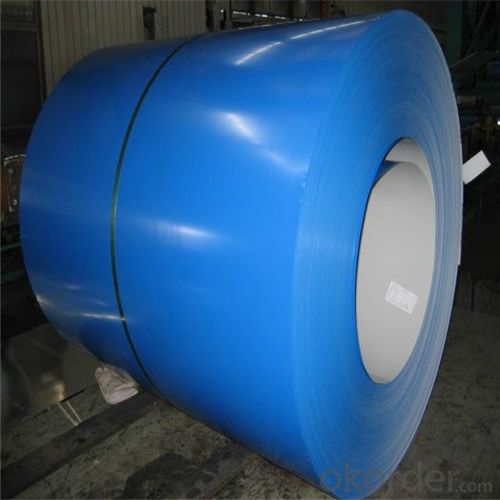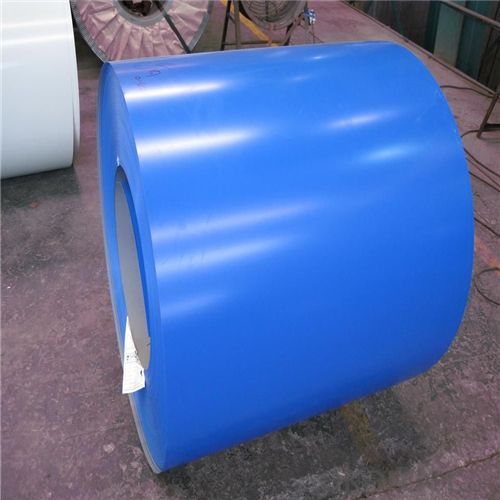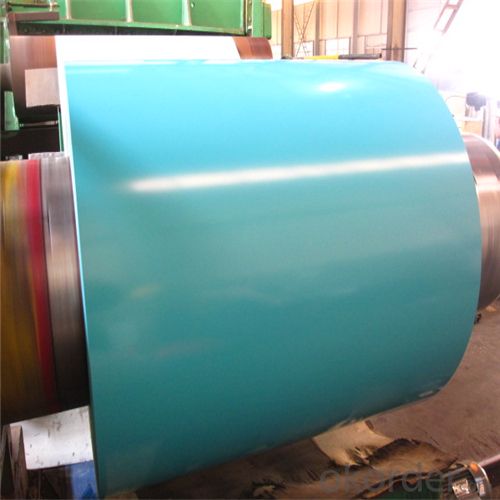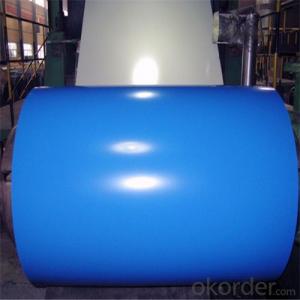Pre-painted Galvanized Steel Coil Used for Industry with Our Very Good Price
- Loading Port:
- Tianjin
- Payment Terms:
- TT OR LC
- Min Order Qty:
- 100 m.t.
- Supply Capability:
- 8000 m.t./month
OKorder Service Pledge
OKorder Financial Service
You Might Also Like
Pre-painted Galvanized Steel Coil Used for Industry
1.Structure of Pre-painted Galvanized Steel Coil Description
With GI as base metal, after pretreatement and liquid dope with several layers of color, then after firing and cooling, finally the plate steel is called pre-painted galvanized steel. Pre-painted galvanized steel is good capable of decoration, molding, corrosion resistance. It generally displays superior workability, durability and weather resistance.
2.Main Features of Pre-painted Galvanized Steel Coil
•High Purity
•Easy control and operation
•High strength
•Fast melting
•Competitive price
•Best Service
3. Pre-painted Galvanized Steel Coil Images



4. Pre-painted Galvanized Steel Coil Specification
Pre-painted Galvanized Steel Coil | |
Thicknenss | 0.18mm-1.5mm |
Width | 900-1250mm |
Coating mass | 30-275g/㎡ |
Paint | PE, PVDF, PU |
Color | RAL Scale |
Coil weight | 3-7mt |
Coil inner diameter | 508 or 610mm |
5.FAQ of Hot-Dip Galvanized Steel Coil
We have organized several common questions for our clients,may help you sincerely:
①How about your company?
A world class manufacturer & supplier of castings forging in carbon steel and alloy steel,is one of the large-scale professional investment casting production bases in China,consisting of both casting foundry forging and machining factory. Annually more than 8000 tons Precision casting and forging parts are exported to markets in Europe,America and Japan. OEM casting and forging service available according to customer’s requirements.
②How to guarantee the quality of the products?
We have established the international advanced quality management system,every link from raw material to final product we have strict quality test;We resolutely put an end to unqualified products flowing into the market. At the same time, we will provide necessary follow-up service assurance.
③How long can we receive the product after purchase?
In the purchase of product within three working days, We will arrange the factory delivery as soon as possible. The pecific time of receiving is related to the state and position of customers.Commonly 7 to 10 working days can be served.
We can supply customers' with different specifications of the highest quality and lowest price.
Sincerely welcome to contact us for the future details if any item interest you ,and we will make every effort to assure that your requirements will be satisfied ,and we hope to establish long-term business relations with you on the basis of the equality and mutual benefit.
We are waiting for your email.
- Q:What are the different types of steel coil coatings?
- Various purposes require the use of different types of steel coil coatings. Some of the most commonly used types include: 1. Galvanized Coating: This coating, based on zinc, offers excellent corrosion resistance to steel coils. It is often utilized in outdoor applications that subject the coils to harsh weather conditions. 2. Galvannealed Coating: Similar to galvanized coating, galvannealed coating also contains zinc, but it undergoes heat treatment to form an alloy with the steel surface. This type of coating provides superior paint adhesion and is frequently employed in applications where the coated coils will be painted or further processed. 3. Pre-painted Coating: As the name suggests, pre-painted coatings are applied to steel coils before they are delivered to customers. These coatings can be made of various materials such as polyester, polyurethane, epoxy, or fluoropolymer. Pre-painted coils are commonly used in the construction, automotive, and appliance industries. 4. Electro-galvanized Coating: This coating is applied to steel coils through an electroplating process, depositing a thin layer of zinc on the steel surface. Electro-galvanized coatings offer good corrosion resistance and are often employed in indoor applications or where a thinner coating is desired. 5. Aluminized Coating: Aluminized coatings involve applying a thin layer of aluminum to the surface of steel coils. This type of coating provides excellent heat resistance and is commonly used in exhaust systems, ovens, and other high-temperature applications. 6. Organic Coatings: Steel coils are typically coated with organic materials to provide additional protection against corrosion and improve aesthetics. These coatings can come in the form of paints, lacquers, or powder coatings, and they can be tailored to meet specific requirements in terms of color, gloss, and durability. In conclusion, the selection of a steel coil coating depends on the specific application, environmental conditions, desired aesthetics, and performance requirements.
- Q:What are the common methods of forming steel coils?
- There are several common methods for forming steel coils, each with its own unique advantages and applications. The most common method is known as hot rolling. This involves heating a large steel slab to a high temperature and passing it through a series of rollers to reduce its thickness. The steel is then coiled into a large, continuous roll. Hot rolling is typically used for producing steel coils with a consistent thickness and a smooth surface finish. It is commonly used in industries such as automotive, construction, and manufacturing. Another method is cold rolling, which is similar to hot rolling but is performed at room temperature. Cold rolling involves passing the steel through a set of rollers to further reduce its thickness and improve its surface finish. This process is often used to produce steel coils with precise dimensions and excellent mechanical properties. Cold-rolled steel coils are commonly used in applications that require high strength, such as in the production of appliances, electrical components, and structural components. A third method is known as galvanizing. This involves coating the steel coil with a layer of zinc to protect it from corrosion. The steel coil is first cleaned and then immersed in a bath of molten zinc. The zinc adheres to the surface of the steel, forming a protective layer. Galvanized steel coils are widely used in outdoor applications, such as roofing, fencing, and automotive parts, due to their excellent corrosion resistance. Lastly, there is the electro-galvanizing method. This process involves applying a thin layer of zinc to the surface of the steel coil through an electroplating process. The steel coil is immersed in an electrolyte solution and an electric current is passed through it, causing the zinc to deposit onto the surface of the steel. Electro-galvanized steel coils are commonly used in industries that require a smooth and aesthetically pleasing finish, such as in the production of appliances, automotive parts, and decorative items. Overall, these common methods of forming steel coils provide a wide range of options for different applications and requirements. Whether it is hot rolling, cold rolling, galvanizing, or electro-galvanizing, each method offers unique benefits in terms of strength, durability, surface finish, and corrosion resistance.
- Q:How are steel coils used in the production of steel bolts?
- Steel coils are used in the production of steel bolts as they serve as the primary raw material. The coils are unwound and fed into a machine that cuts and shapes the steel into bolts of the desired size and shape. The coils provide a continuous supply of high-quality steel, ensuring the consistency and strength of the bolts produced.
- Q:How are steel coils used in the manufacturing of roofing materials?
- Steel coils are used in the manufacturing of roofing materials as they serve as a primary raw material for producing metal roofing sheets and tiles. These coils are processed through a series of steps such as cleaning, coating, and shaping to create durable and weather-resistant roofing products. The steel coils are rolled out and cut into the desired size and shape, ensuring uniformity and precision in the manufacturing process. These roofing materials made from steel coils offer exceptional strength, longevity, and protection against various weather conditions, making them a popular choice for residential and commercial buildings.
- Q:So...that means Wolverine can stab him, right? Because Adamantite is stronger than steel. Correct?
- Not really, it's just a nickname. Wolverine couldn't stab Superman.
- Q:What is the role of steel coils in the oil and gas industry?
- The oil and gas industry heavily relies on steel coils, which have a crucial role to play. These coils are primarily utilized for the transportation and storage of oil and gas products. Typically, they are crafted from high-quality steel and designed to endure the harsh conditions encountered during the extraction, processing, and distribution of oil and gas. One of the key functions of steel coils in this industry is to serve as containers for transportation purposes. Oil and gas are frequently transported over long distances, either through pipelines or tankers. Steel coils are used in the construction of these pipelines and storage tanks, providing a robust and secure means of transporting these valuable resources. The strength of steel ensures that the pipelines and storage facilities can withstand the pressure and temperature fluctuations that occur during transportation. Steel coils also play an essential role in the production of drilling equipment. The drilling process involves extracting oil and gas from deep underground reservoirs. Steel coils are employed in the manufacturing of various components of drilling rigs, including pipes, casings, and wellheads. These components must be capable of withstanding the high pressures and temperatures encountered during drilling operations. Steel coils offer the necessary strength and durability to ensure the reliability and safety of drilling equipment. Additionally, steel coils are utilized in the construction of offshore platforms, which are bases for drilling operations in offshore oilfields. The severe marine environment, characterized by saltwater exposure and strong winds, demands materials that can resist corrosion and provide structural integrity. Steel coils are used to fabricate the structural components of these offshore platforms, ensuring their ability to withstand the challenging offshore conditions. In conclusion, steel coils are indispensable in the oil and gas industry. They are employed for the transportation and storage of oil and gas products, the construction of pipelines and storage tanks, the manufacturing of drilling equipment, and the fabrication of offshore platforms. The strength, durability, and resistance to harsh conditions make steel coils an essential material in this industry.
- Q:What is the maximum thickness of steel coils?
- The maximum thickness of steel coils can vary depending on the specific application and manufacturing process. However, in general, steel coils can have a maximum thickness ranging from a few millimeters to several centimeters. The thickness is typically determined by factors such as the intended use of the steel coils, the type of steel being used, and the capabilities of the manufacturing equipment.
- Q:What is the standard thickness of steel coils?
- The specific application and industry requirements dictate the standard thickness of steel coils, which can vary. Generally, steel coils are obtainable in thicknesses ranging from 0.5mm to 10mm. Various factors, including intended use, structural requirements, and manufacturing processes, influence the desired thickness of a steel coil. Heavier applications that necessitate increased strength and durability typically employ thicker coils. Conversely, thinner coils are suitable for lighter applications where flexibility and weight reduction are crucial. To determine the appropriate thickness for steel coils in a particular application, it is essential to consult industry standards and specific project requirements.
- Q:How are steel coils used in the manufacturing of engine components?
- Steel coils are used in the manufacturing of engine components as they provide a strong and durable material for various parts. These coils are typically processed and shaped into specific components such as pistons, crankshafts, cylinder heads, and connecting rods, which are vital for the proper functioning of an engine. The high strength and heat resistance of steel make it an ideal choice for these critical components, ensuring the engine's reliability and performance.
- Q:hello guys. im totally new to this metalwork things. i need to do it for my project. i need to join stainless steel wires to build some kind of structure (eiffel tow. for example).i already have the wire and the torch. now the question is: where do i get silver solder? is it expensive? and what is flux for? is it necessary? what does it do? is it expensive?thank u for ur time guys! :)
- the flux you need is powdered borax
1. Manufacturer Overview |
|
|---|---|
| Location | |
| Year Established | |
| Annual Output Value | |
| Main Markets | |
| Company Certifications | |
2. Manufacturer Certificates |
|
|---|---|
| a) Certification Name | |
| Range | |
| Reference | |
| Validity Period | |
3. Manufacturer Capability |
|
|---|---|
| a)Trade Capacity | |
| Nearest Port | |
| Export Percentage | |
| No.of Employees in Trade Department | |
| Language Spoken: | |
| b)Factory Information | |
| Factory Size: | |
| No. of Production Lines | |
| Contract Manufacturing | |
| Product Price Range | |
Send your message to us
Pre-painted Galvanized Steel Coil Used for Industry with Our Very Good Price
- Loading Port:
- Tianjin
- Payment Terms:
- TT OR LC
- Min Order Qty:
- 100 m.t.
- Supply Capability:
- 8000 m.t./month
OKorder Service Pledge
OKorder Financial Service
Similar products
New products
Hot products
Related keywords





























